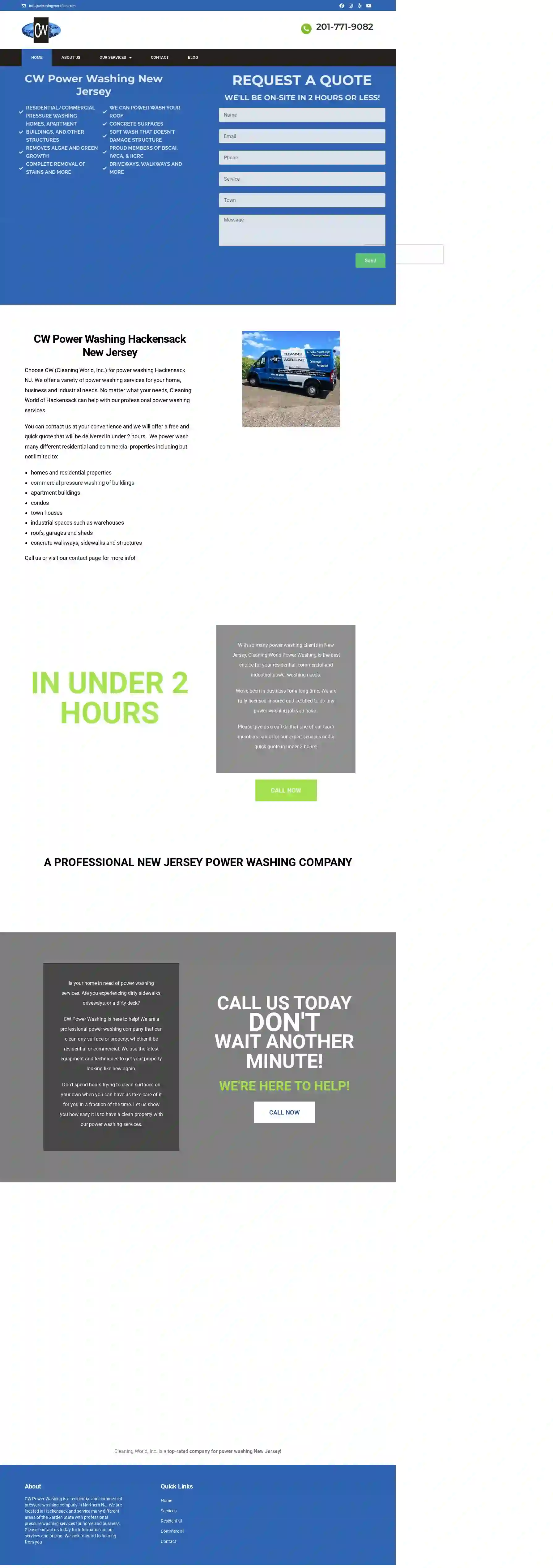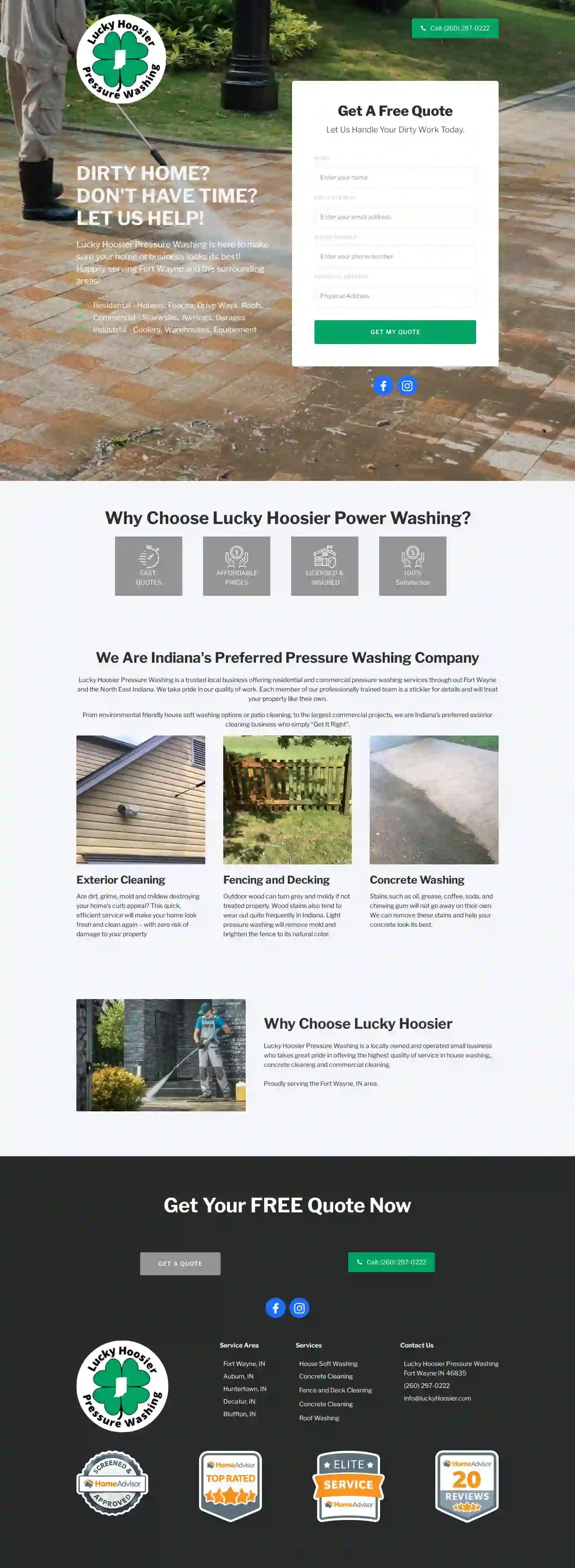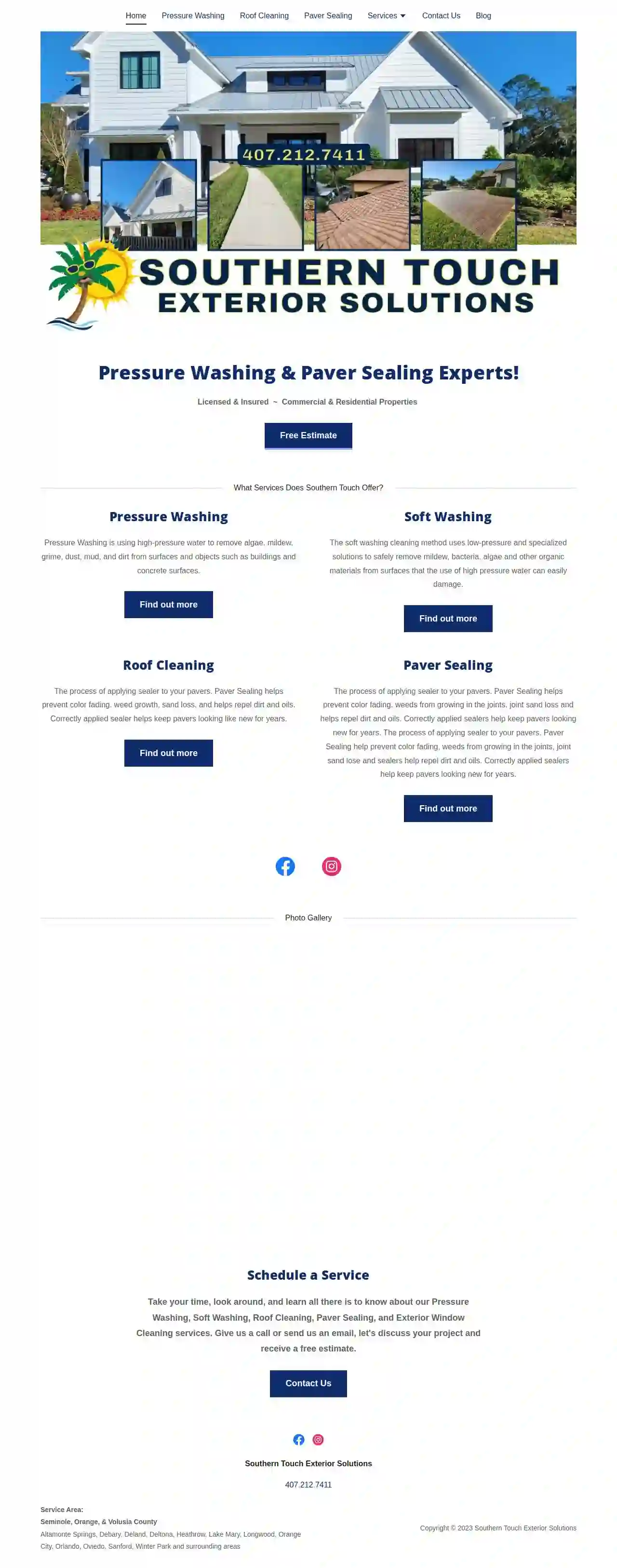Pressure Washing Medford
Find Driveway Cleaning in Medford
Receive 3 FREE Driveway Cleaning quotes for your project today! Compare profiles, reviews, accreditations, portfolio, etc... and choose the best service.

Pickup Power Washing LLC.
579 reviewsEwing, New Jersey, 25 Van Saun Drive, 08628, USPickup Power Washing LLC is a veteran-owned and family-operated pressure washing business providing quality house washing, roof cleaning, concrete cleaning, and a range of other exterior cleaning services. Our skilled technicians are detailed, thorough, and eager to please, ensuring outstanding customer service and attention to detail.
- Services
- Why Us?
- Accreditations
- Our Team
- Testimonials
- Gallery
Get Quote
Wash Pros Plus
535 reviews123 Main St, Fort Wayne, 46825, USWelcome to Wash Pros Plus – Your Trusted Partner in Professional Power, Pressure, and Soft Washing! At Wash Pros Plus, we take pride in being the go-to power washing company in the greater Fort Wayne area. With over 20 years of experience, our locally owned and operated business is dedicated to delivering top-notch services with a keen eye for detail and a commitment to outstanding customer satisfaction. We specialize in transforming surfaces and enhancing the curb appeal of residential and commercial properties. Connect with us for unparalleled cleanliness and exceptional service.
- Services
- Why Us?
- Gallery
Get Quote
Exterior Cleaning Pressure Washing LLC
5139 reviewsJacksonville, USExterior Cleaning Pressure Washing is here to solve all of your exterior cleaning needs. Our fast, friendly, and efficient technicians can restore the appearance of your home back to the day you bought it. From the most basic of driveway pressure washing to softwash cleaning of your roof, we can handle it all. We are properly licensed & insured to protect you and your home. Experienced and Reliable Detailed Oriented Services Customer Satisfaction Guaranteed. We can help increase your property value and have by your property looking amazing for any season. check out some of our Google reviews
- Services
- Why Us?
- Gallery
Get Quote
CW Power Washing New Jersey
513 reviewsJersey City, USCW Power Washing is a residential and commercial pressure washing company in Northern NJ. We are located in Hackensack and service many different areas of the Garden State with professional pressure washing services for home and business. Please contact us today for information on our services and pricing. We look forward to hearing from you
- Services
- Why Us?
- Accreditations
- Gallery
Get Quote
Lucky Hoosier Pressure Washing
510 reviewsFort Wayne IN, Fort Wayne, 46835, USDIRTY HOME? DON'T HAVE TIME? LET US HELP! Lucky Hoosier Pressure Washing is here to make sure your home or business looks its best! Happily serving Fort Wayne and the surrounding areas! Residential - Houses, Fences, Drive Ways, Roofs Commercial - Sidewalks, Awnings, Garages Industrial - Coolers, Warehouses, Equipement Get A Free Quote Let Us Handle Your Dirty Work Today. Why Choose Lucky Hoosier Power Washing? FAST QUOTES AFFORDABLE PRICES LICENSED & INSURED 100% Satisfaction We Are Indiana's Preferred Pressure Washing Company Lucky Hoosier Pressure Washing is a trusted local business offering residential and commercial pressure washing services through out Fort Wayne and the North East Indiana. We take pride in our quality of work. Each member of our professionally trained team is a stickler for details and will treat your property like their own. From environmental friendly house soft washing options or patio cleaning, to the largest commercial projects, we are Indiana's preferred exterior cleaning business who simply “Get It Right”. Exterior Cleaning Are dirt, grime, mold and mildew destroying your home’s curb appeal? This quick, efficient service will make your home look fresh and clean again – with zero risk of damage to your property Fencing and Decking Outdoor wood can turn grey and moldy if not treated properly. Wood stains also tend to wear out quite frequently in Indiana. Light pressure washing will remove mold and brighten the fence to its natural color. Concrete Washing Stains such as oil, grease, coffee, soda, and chewing gum will not go away on their own. We can remove these stains and help your concrete look its best. Why Choose Lucky Hoosier Lucky Hoosier Pressure Washing is a locally owned and operated small business who takes great pride in offering the highest quality of service in house washing,, concrete cleaning and commercial cleaning. Proudly serving the Fort Wayne, IN area. Get Your FREE Quote Now Copyright © 2020 Lucky Hoosier. All rights reserved.
- Services
- Why Us?
- Gallery
Get Quote
Semper Fi Pressure Washing LLC
5129 reviewsFranklin, USDon't let stains and clutter sit too long and compromise your property’s value and your health. At Semper Fi Pressure Washing, we provide various pressure cleaning services in Central Florida that’ll eliminate accumulated mold, stains, mud, and more to give you the breath of fresh air you deserve. We also assist with brick paver and natural stone sealing, and non-pressure roof cleaning. Special Offer Up to 10% Off for Service Veterans Pressure Washing Rely on our skilled team and top-of-the-line equipment for residential and commercial pressure washing services. We deliver on our promise of a cleaner residential or commercial property while preventing damage and nipping health concerns in the bud. Roof Cleaning Pressure washing your roof is a big mistake. At Semper Fi Pressure Washing, we offer a non-pressure roof cleaning service that ensures your roof will be mold and mildew free without incurring damage by using the proper equipment. Brick Paver & Natural Stone Sealing Using natural stone and brick is sustainable, easy to maintain, and naturally charming. We can help you care for it, as our qualified teams are certified techs by Seal ‘n Lock. Our experts can seal anything from brick to natural stone. Set Up An Appointment Today Our Team Semper Fi Pressure Washing of Central Florida covers all your pressure washing needs. We don’t charge for an estimate, and responding to calls within the same day is our standard practice. We are a veteran-owned business made up of consistently punctual and courteous people. Our team is reliable, pays attention to every detail, and prioritizes customer service. We have full liability coverage to keep our team safe. Moreover, our workplace is drug-free and workman’s compensation compliant. We are also bonded, so putting your trust in us will always be a great decision. Call us at (321) 332-8701 to learn more about our services or get an estimate Our Promise You can rely on us to get the job done ASAP. Our top-of-the-line equipment is well maintained and can handle all tasks at hand. Rest assured that we will finish our service on time without having to postpone or ask for extensions.
- Services
- Why Us?
- Accreditations
- Gallery
Get Quote
Duval Pressure Washing
533 reviewsJacksonville, 32224, USDuval Pressure Washing is Jacksonville's premier pressure washing company, founded in 2020 by David Mulvaney II. We're a family-owned and operated business dedicated to providing top-notch pressure washing services tailored to your specific needs. We understand that every property is unique, so we offer a range of cleaning options, including house washing, driveway washing, roof cleaning, paver cleaning, deck washing, fence washing, gutter cleaning, water stain removal, and commercial pressure washing. Our team of highly trained professionals utilizes the latest techniques and equipment to ensure a thorough and effective clean while prioritizing the safety of your property. We're committed to exceeding your expectations with our honest, upfront pricing and unwavering dedication to customer satisfaction. If you're looking for reliable and professional pressure washing services in Jacksonville, look no further than Duval Pressure Washing.
- Services
- Why Us?
- Accreditations
- Our Team
- Gallery
Get Quote
Eddie's Pressure Washing LLC
5191 reviews1000 Lake Mary Blvd, Suite 100, Lake Mary, 32771, USEddie's Pressure Washing is a professional exterior cleaning company serving Seminole County and surrounding areas in Florida. Established in 2019, the company specializes in providing safe and effective pressure washing and soft washing services for both residential and commercial properties. Eddie's Pressure Washing is committed to using eco-friendly practices and biodegradable cleaning solutions to minimize their environmental impact. They prioritize customer satisfaction by offering transparent pricing, clear communication, and personalized service. Eddie's Pressure Washing has a proven track record of success, having cleaned hundreds of properties annually. Their team of experts utilizes advanced techniques to deliver exceptional results that enhance the aesthetic appeal of commercial spaces and revitalize residential exteriors.
- Services
- Why Us?
- Gallery
Get Quote
Southern Touch Exterior Solutions
52 reviewsFranklin, USSouthern Touch Exterior Solutions is your trusted partner for all your pressure washing, soft washing, roof cleaning, paver sealing, and exterior window cleaning needs in Seminole, Orange, and Volusia County. We are a licensed and insured company dedicated to providing high-quality services to both commercial and residential properties. Our team of experienced professionals utilizes the latest equipment and techniques to ensure exceptional results. We understand that your time and project are important, so we strive to provide prompt and reliable service. Contact us today for a free estimate and let us help you enhance the curb appeal and value of your property.
- Services
- Why Us?
- Gallery
Get Quote
National Pressure Cleaning
7025 Co Rd 46A, Lake Mary, 32746, USNational Pressure Cleaning is a family-owned and operated business serving Seminole County, Orange County, and Volusia County, Florida. With over 20 years of experience in the industry, they offer residential and commercial pressure washing services. They pride themselves on providing quality work at a competitive price, guaranteeing customer satisfaction. Their team is licensed and insured, ensuring peace of mind for their clients.
- Services
- Why Us?
- Testimonials
- Gallery
Get Quote
Over 60,241+ Cleaning Services on our directory
Our janitorial companies operate in Medford and beyond!
CleaningMatch has curated and vetted the Best Cleaning Companies arround Medford. Find a top & trustworthy business today.
Frequently Asked Questions About Pressure Washing
- Online Reviews: Check online reviews on platforms like Google, Yelp, and Facebook to gauge customer satisfaction and service quality.
- Experience and Expertise: Look for companies with a proven track record and experience in pressure washing various surfaces.
- Licensing and Insurance: Ensure the company is licensed and insured to protect you from liability in case of accidents or damage.
- Equipment and Techniques: Inquire about the company's equipment and techniques to ensure they use appropriate pressure levels and cleaning solutions for different surfaces.
- Quotes and Pricing: Obtain detailed quotes from multiple pressure washing companies and compare their pricing. Make sure the quotes are transparent, outlining all services and costs.
- Professionalism and Communication: Choose a company that is responsive, provides clear communication, and demonstrates professionalism in its interactions.
- Annually: Pressure washing your house at least once a year helps remove accumulated dirt, grime, and other contaminants, keeping it looking its best.
- Every 2-3 Years: If you live in an area with high humidity, heavy tree cover, or frequent exposure to pollutants, more frequent pressure washing may be necessary.
- When Visible Dirt and Grime Appear: Address visible dirt, stains, or mold growth promptly to prevent them from becoming more challenging to remove.
- Enhanced Curb Appeal: Pressure washing removes dirt, grime, and stains, instantly revitalizing the appearance of your property and boosting curb appeal.
- Improved Health and Safety: Pressure washing removes mold, mildew, algae, and other contaminants that can pose health risks and create slippery surfaces.
- Increased Property Value: A well-maintained exterior, achieved through regular pressure washing, can increase the value of your property.
- Preventative Maintenance: Pressure washing removes dirt and grime that can deteriorate surfaces over time, extending the lifespan of your driveway, deck, fence, and other exterior features.
- Preparation for Painting or Staining: Pressure washing is an essential step before painting or staining, as it provides a clean and receptive surface for the new coating to adhere to.
- Wood Siding: High-pressure washing can damage wood fibers, leading to splintering or etching. Soft washing is the recommended method for cleaning wood siding.
- Asphalt Shingles: High-pressure water can dislodge granules from asphalt shingles, reducing their lifespan. Soft washing is a gentler alternative for roof cleaning.
- Painted Surfaces: High pressure can strip paint from surfaces. Always test pressure washing on an inconspicuous area before cleaning painted surfaces.
- Windows and Screens: The force of pressure washing can break windows or damage delicate window screens. Traditional cleaning methods are better suited for windows and screens.
How do I find a good pressure washing service?
Utilize online directories like CleaningMatch to find and compare qualified pressure washing services in your area.
How often should I pressure wash my house?
Regular pressure washing can maintain your home's exterior, extend the lifespan of your siding, and enhance its curb appeal.
What are the benefits of pressure washing?
Whether you're looking to improve your property's appearance, protect its value, or enhance health and safety, pressure washing is a valuable investment.
Is pressure washing safe for all surfaces?
Always consult with a professional pressure washing company to determine the appropriate cleaning method for your specific surfaces.
How do I find a good pressure washing service?
- Online Reviews: Check online reviews on platforms like Google, Yelp, and Facebook to gauge customer satisfaction and service quality.
- Experience and Expertise: Look for companies with a proven track record and experience in pressure washing various surfaces.
- Licensing and Insurance: Ensure the company is licensed and insured to protect you from liability in case of accidents or damage.
- Equipment and Techniques: Inquire about the company's equipment and techniques to ensure they use appropriate pressure levels and cleaning solutions for different surfaces.
- Quotes and Pricing: Obtain detailed quotes from multiple pressure washing companies and compare their pricing. Make sure the quotes are transparent, outlining all services and costs.
- Professionalism and Communication: Choose a company that is responsive, provides clear communication, and demonstrates professionalism in its interactions.
Utilize online directories like CleaningMatch to find and compare qualified pressure washing services in your area.
How often should I pressure wash my house?
- Annually: Pressure washing your house at least once a year helps remove accumulated dirt, grime, and other contaminants, keeping it looking its best.
- Every 2-3 Years: If you live in an area with high humidity, heavy tree cover, or frequent exposure to pollutants, more frequent pressure washing may be necessary.
- When Visible Dirt and Grime Appear: Address visible dirt, stains, or mold growth promptly to prevent them from becoming more challenging to remove.
Regular pressure washing can maintain your home's exterior, extend the lifespan of your siding, and enhance its curb appeal.
What are the benefits of pressure washing?
- Enhanced Curb Appeal: Pressure washing removes dirt, grime, and stains, instantly revitalizing the appearance of your property and boosting curb appeal.
- Improved Health and Safety: Pressure washing removes mold, mildew, algae, and other contaminants that can pose health risks and create slippery surfaces.
- Increased Property Value: A well-maintained exterior, achieved through regular pressure washing, can increase the value of your property.
- Preventative Maintenance: Pressure washing removes dirt and grime that can deteriorate surfaces over time, extending the lifespan of your driveway, deck, fence, and other exterior features.
- Preparation for Painting or Staining: Pressure washing is an essential step before painting or staining, as it provides a clean and receptive surface for the new coating to adhere to.
Whether you're looking to improve your property's appearance, protect its value, or enhance health and safety, pressure washing is a valuable investment.
Is pressure washing safe for all surfaces?
- Wood Siding: High-pressure washing can damage wood fibers, leading to splintering or etching. Soft washing is the recommended method for cleaning wood siding.
- Asphalt Shingles: High-pressure water can dislodge granules from asphalt shingles, reducing their lifespan. Soft washing is a gentler alternative for roof cleaning.
- Painted Surfaces: High pressure can strip paint from surfaces. Always test pressure washing on an inconspicuous area before cleaning painted surfaces.
- Windows and Screens: The force of pressure washing can break windows or damage delicate window screens. Traditional cleaning methods are better suited for windows and screens.
Always consult with a professional pressure washing company to determine the appropriate cleaning method for your specific surfaces.